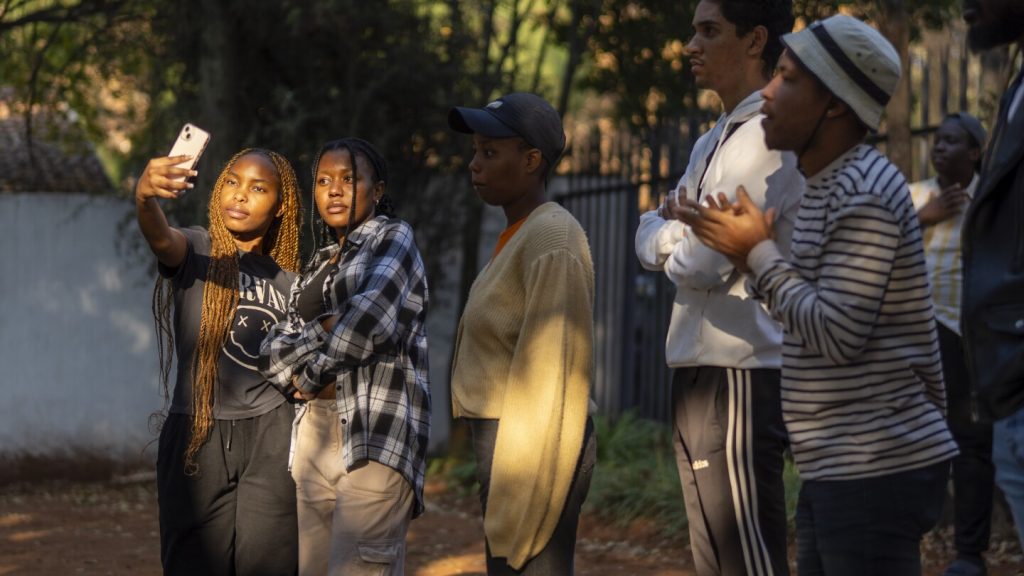Summarize this content to 2000 words in 6 paragraphs in Arabic
NKANDLA, South Africa (AP) — Months ahead of South Africa’s election, 20-year-old Amahle Ncane and her friends decided to turn peer pressure on its head and made their own special pact: Unlike their parents’ lost dreams after the high hopes of the first democratic elections in 1994, they are going to keep theirs alive through the ballot. On election day on Wednesday, the first time voters, moving as a group, flocked to the polling station at Ntolwane Primary School in Nkandla, a rural area in the eastern province of KwaZulu-Natal.Outside the dusty school premises in the mountainous and picturesque area, they hugged, danced and sang “we are fearless.” Joining them was 56-year-old Sigcino Mfundisi Thusi. “I was also a first time voter in 1994,” he told them, referring to the defining first-all race vote that ended the white minority rule of apartheid 30 years ago. He then spoke about the despondency that crept in later due to unfulfilled promises related to high unemployment, corruption and poor service delivery.
“I am sure our parents were dancing like this in 1994, but they are still miserable. I don’t want to be like them, our dreams cannot be put on hold,” young Ncane responded, with her friends shouting in agreement.
Thusi and the girls laughed off the jibes, but the conversation highlighted how young South Africans, unlike the older generation, are determined to see their vote count and their dreams come to fruition in a country where youth poverty has become a signature of unfulfilled post-apartheid aspirations. Many youths have seen this election as the most important since the end of apartheid, with several opinion polls putting the governing African National Congress party’s support at less than 50% before this vote amid the frustrations.
“My vote today signifies a lot because there is so much that we are still hopeful for,” Ncane later said.
The problems they need solved are palpable. South Africa’s official unemployment rate is at 32%, with the number of unemployed people rising from 5.1 million in 2014 to 8.2 million this year, according to official figures.Young people are most affected, according to the latest labor survey released by the country’s statistical agency two weeks before the election.Between the last quarter of 2023 and the first quarter of 2024, the number of unemployed youth rose by 236,000 to 4.9 million, the survey said. Ncane was born 10 years into South Africa’s freedom from apartheid. She has heard tales from her parents about how they endured apartheid, celebrated at being allowed to vote for the first time in 1994 before despair took over.The despair had put South Africa’s young democracy at risk, as despondency led both the young and the old to stay away from the ballot box in elections following the historic 1994 vote.Voter turnout that stood at close to 87% in 1994 dropped to 66% in the last general election in 2019.It plummeted to just over 45% in local government elections held in 2021, according to German think tank, Konrad Adenauer Foundation, which has offices in South Africa.
Young people, who make the majority of South Africa’s 60 million population, appeared less bothered to participate in that election.The report noted that about 1.8 million of the 18-19-year-olds eligible to vote in the election, 90% did not register. Fewer than 20% of those aged 20 to 35 registered to vote, compared to over 90% of the population aged 40, according to the report, which noted reasons for not voting as partly due to “insufficient changes to people’s own personal circumstances.”But Ncane saw circumstances changing in her rural community. Many young people, unable to find jobs and educational opportunities, lurched onto drugs and crime, vices previously largely associated with urban areas.Despite being high school students, Ncane and her group of friends decided to drive positive change among their peers by going around the village, nudging their colleagues to register as voters.“Youths don’t see a future so our job is to convince them that they have a chance to influence the future they want. We are trying to give them confidence to vote,” she said.
More than 27 million people have registered to vote, the highest since the advent of democracy in the country. Over 40% of them are aged between 18 and 39, according to the country’s elections management body, thanks to campaigns by the government, political parties and young people like Ncane.“After the 1994 elections in South Africa, voters under 25 haven’t been participating in the same way as other age groups. Many parties saw this year as an opportunity to change that,” said Christopher Stone, a professor at Oxford University’s Blavatnik School of Government, who has been watching the election closely. Late voter registration figures were more telling. When the country’s electoral management body announced a window for a round of late voter registration during a weekend in November last year, close to 80% of first-time registrations were of people younger than 29, according to the country’s elections management body.
It is a trend that Ncane, who aspires to study for a politics degree after high school, wants to keep up.“I don’t care about their political affiliations, I just want young people to vote,” she said, heading back home with her friends to wait for the election results.___AP Africa news: https://apnews.com/hub/africa
window.fbAsyncInit = function() {
FB.init({
appId : ‘870613919693099’,
xfbml : true,
version : ‘v2.9’
});
};
(function(d, s, id){
var js, fjs = d.getElementsByTagName(s)[0];
if (d.getElementById(id)) {return;}
js = d.createElement(s); js.id = id;
js.src = “https://connect.facebook.net/en_US/sdk.js”;
fjs.parentNode.insertBefore(js, fjs);
}(document, ‘script’, ‘facebook-jssdk’));


